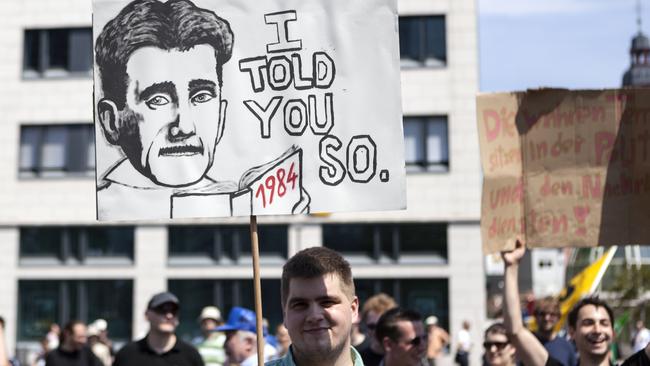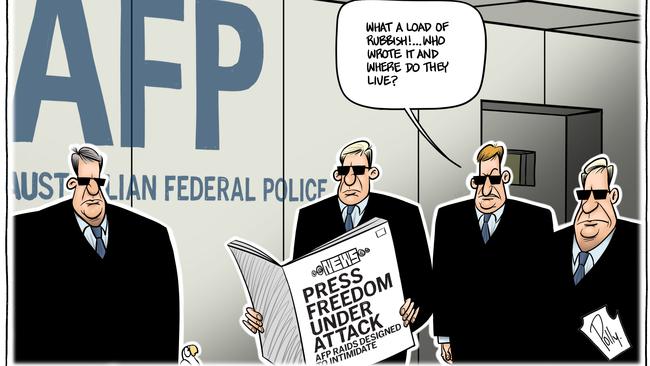Let’s not be naive about the implications of AFP raids
No one wants domestic terrorism to flourish but writing a legal blank cheque to allow surveillance of anyone at any time, and potentially jail journalists who report it, will create a totalitarian society, writes Dr Paul Williams.
Rendezview
Don't miss out on the headlines from Rendezview. Followed categories will be added to My News.
Exactly 70 years ago this month, the literary world saw arguably the greatest politically-themed novel published in the English language.
So profound has the impact of George Orwell’s Nineteen-Eighty-Four been that “Orwellian” is now a pungent adjective for any government peering too closely into the lives of its citizens.
Forever traumatised by the Spanish Civil War and Stalin’s purges in 1930s Russia, Orwell understood better than most the abuse of power and authority in the revered name of strong leadership.
MORE FROM PAUL WILLIAMS: One Nation belongs somewhere, but not parliament
Amazingly, Orwell didn’t just write a gripping yarn of human survival; he embedded within its pages a scholarly treatise, “The Theory and Practice of Oligarchical Collectivism”, that is as clever and as confronting as the Newspeak dictionary itself. Doubleplus good.
Few in 1948 could have imagined just how soon the technology behind Orwell’s dystopia would arrive. Who could have known that, within a single lifetime, the omnipresent screens and cameras of Orwell’s fiction — following Winston Smith’s every move — could live in supposedly robust democracies like Britain or Australia?

Yes, it’s become a truism that facial recognition technology and tech giants’ tracking of our online lives know more about our daily movements than we do ourselves.
MORE FROM PAUL WILLIAMS: The election message our politicians missed
Westerners, of course, have long read Orwell’s nightmare as entertaining fiction more than prophetic warning.
How could Australia — the laconic, laid back land of the “fair go” — resemble anything like Airstrip One? It’s that nonchalance that bothers me most. Convinced our democracy is permanent and impregnable, Australians feel safe that what occurs in, for example, China — where the government uses technology to watch and reward those who obey the Communist Party, and punish those who don’t — could never happen here.
Well, certainly not today. And probably not tomorrow. But never? Only the naive could believe that.
\

I thought of the naive last week when Australian Federal Police raided the home of a journalist who, in 2018, used in her news story leaked information suggesting Australian spy agencies, briefed to gather intelligence on foreign nationals, might have the capacity to spy on innocent Australians at home.
MORE FROM RENDEZVIEW: Freedoms that underpin our democracy are at risk
That allegation alone is concerning. But the fact law enforcement chose to pursue journalists as the mere messengers — the second largest body of investigators in Australia and responsible for uncovering all sorts of wrongdoing — is downright alarming.
It’s even more so when remembering that journalists face 10 years’ jail for merely doing a job that all real democracies demand. Put simply, doing journalism — including the reporting of corruption — is not a crime. And nor is whistleblowing.
Think I’m being shrill? When media organisations as diverse as News Corp, Nine-Fairfax and the ABC jointly condemn the raids as an attack on democracy, you know something is genuinely wrong.
MORE FROM RENDEZVIEW: After the AFP raids politicians must choose a side
Even more worrying is the fact many ill-informed Australians applaud these raids because mainstream journalism, too often derided as elitist and fake, is now held in low regard.
Meanwhile, those on the political fringes applaud the raids because they sit comfortably with an authoritarian world view that insists strong leaders are always right.
“So what if the government watches my neighbours, or a few journos go to jail,” they say, “if it means we catch a terrorist.”
And that’s where the debate becomes tricky. First, no one wants domestic terrorism to flourish. Therefore, governments and law enforcement officers do require powers to monitor and disrupt any group threatening national security.
It also means individuals must surrender certain civil liberties at airports and elsewhere if the group is to remain safe. It also means governments have the right to keep certain information secret, and that they’re entitled to prosecute those who steal information which, if made public, threatens public safety.
MORE FROM PAUL WILLIAMS: There’s only one way to fix our donations system
But those entitlements are not limitless and writing a legal blank cheque to allow law enforcement bodies to surveil anyone at any time, and potentially jail journalists who report that surveillance, will inevitably create the very totalitarian Big Brother society we’re all supposed to be fighting to avoid.
So what’s the answer? Australia must tighten its “shield laws” to better protect not only journalists but also the sources and whistleblowers on whom journalists’ investigations so often depend.
We also must ensure more than a single judge or magistrate is required to authorise a search warrant on a journalist. And we need to educate complacent Australians that mainstream journalism is not “fake news” but the thin inky line defending democracy from despotism.
No matter what governments say, two plus two is never five, and the clock never strikes 13.
Dr Paul Williams is a senior lecturer at Griffith University.


